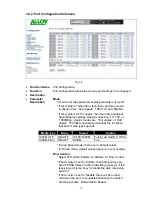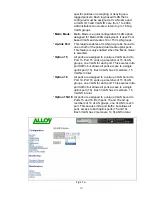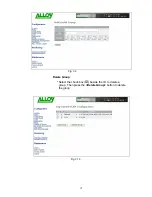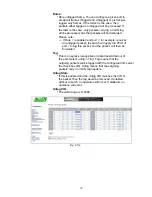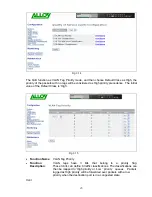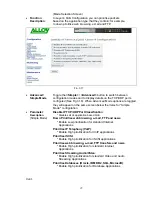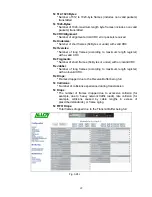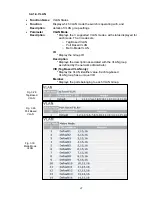
Fig. 3.18
•
Advanced
:
The Advanced Configuration Mode interface box allows you
Mode
to further customise the initial simple configuration defaults with your
own TCP/UDP port definitions, or to create your own definition list
from scratch. (Refer to Fig 3.18)
•
Parameter
:
Special TCP/UDP class
:
Description
* Select the custom TCP/UDP port definitions as ‘High’ or
‘Low’
priority
Default class (all other TCP/UDP ports)
:
* Select all other TCP/UDP ports as a default priority class
of ‘High’ or ‘Low’
Port
:
* Select the port which your Special TCP/UDP class will
apply. Optionally you can select to control all ports at the
same time from the “All” selection.
Special UDP/TCP Port Selection
:
The following are port numbers defined by the six specific default
TCP/UDP
L4
rules:
* Down Prioritise web browsing, e-mail, FTP and news:
port
number
80,280,443,25,110,20,21,69,119,2009
* Prioritise IP Telephony (VoIP):1718, 1719, 1720
* Prioritise iSCSI: 3225, 3260, 3420
* Prioritise web browsing, e-mail, FTP transfers and news:
80,280,443,25,110,20,21,69,119,2009
* Prioritise Streaming Audio/Video: 2979, 1755, 7070,
7071, 554, 8000
* Prioritise Databases (Oracle, IBM DB2, SQL, Microsoft):
66, 1571, 1575, 523,118, 156, 3306,1232,1433,1434
29
Summary of Contents for 16-PORT GIGABIT WEB SMART SWITCH GSS-16T2SFP
Page 2: ...ii June 24th 20005...
Page 6: ......



